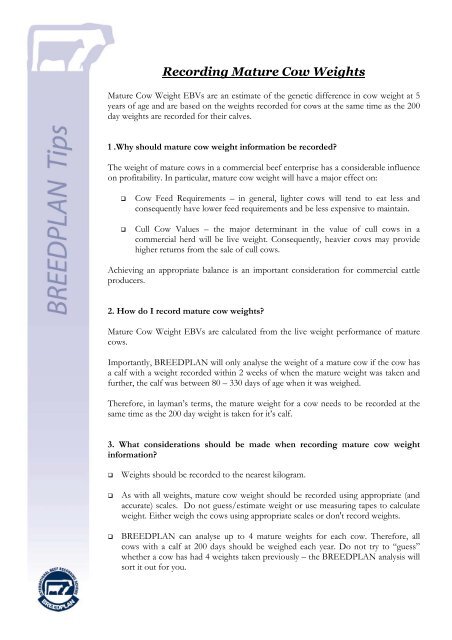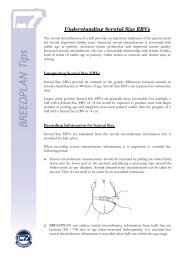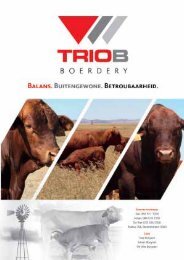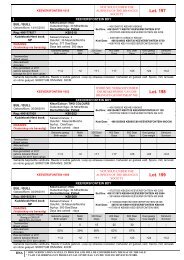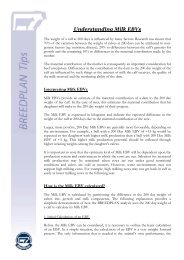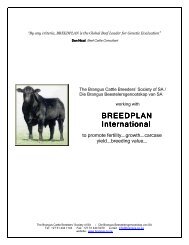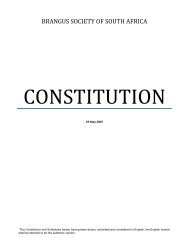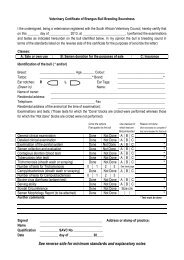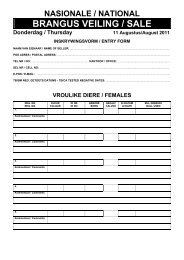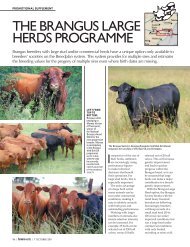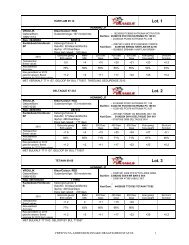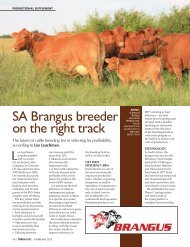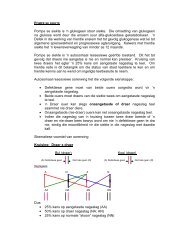Recording Mature Cow Weights - The Brangus Cattle Breeders ...
Recording Mature Cow Weights - The Brangus Cattle Breeders ...
Recording Mature Cow Weights - The Brangus Cattle Breeders ...
Create successful ePaper yourself
Turn your PDF publications into a flip-book with our unique Google optimized e-Paper software.
<strong>Recording</strong> <strong>Mature</strong> <strong>Cow</strong> <strong>Weights</strong><strong>Mature</strong> <strong>Cow</strong> Weight EBVs are an estimate of the genetic difference in cow weight at 5years of age and are based on the weights recorded for cows at the same time as the 200day weights are recorded for their calves.1 .Why should mature cow weight information be recorded?<strong>The</strong> weight of mature cows in a commercial beef enterprise has a considerable influenceon profitability. In particular, mature cow weight will have a major effect on:<strong>Cow</strong> Feed Requirements – in general, lighter cows will tend to eat less andconsequently have lower feed requirements and be less expensive to maintain.Cull <strong>Cow</strong> Values – the major determinant in the value of cull cows in acommercial herd will be live weight. Consequently, heavier cows may providehigher returns from the sale of cull cows.Achieving an appropriate balance is an important consideration for commercial cattleproducers.2. How do I record mature cow weights?<strong>Mature</strong> <strong>Cow</strong> Weight EBVs are calculated from the live weight performance of maturecows.Importantly, BREEDPLAN will only analyse the weight of a mature cow if the cow hasa calf with a weight recorded within 2 weeks of when the mature weight was taken andfurther, the calf was between 80 – 330 days of age when it was weighed.<strong>The</strong>refore, in layman’s terms, the mature weight for a cow needs to be recorded at thesame time as the 200 day weight is taken for it’s calf.3. What considerations should be made when recording mature cow weightinformation?<strong>Weights</strong> should be recorded to the nearest kilogram.As with all weights, mature cow weight should be recorded using appropriate (andaccurate) scales. Do not guess/estimate weight or use measuring tapes to calculateweight. Either weigh the cows using appropriate scales or don't record weights.BREEDPLAN can analyse up to 4 mature weights for each cow. <strong>The</strong>refore, allcows with a calf at 200 days should be weighed each year. Do not try to “guess”whether a cow has had 4 weights taken previously – the BREEDPLAN analysis willsort it out for you.
For temperate breeds, BREEDPLAN will only analyse a mature cow weight if thecow is older than 2.4 years of age (870 days) at weighing. For tropical breeds, thisage is 3.0 years (1090 days).BREEDPLAN will only analyse the mature cow weight performance of a cow if herfirst valid mature cow weight has been taken before she is 6 years of age (2200 days).If not, then none of her mature weights will be analysed.It is essential that correct management group information is recorded with maturecow weight performance.Management groups work slightly differently for mature cow weights. If nomanagement group information is defined for a set of mature cow weights, theBREEDPLAN analysis will use the management groups submitted with the 200 dayweights of their calves to sub-group the weights of the cows. <strong>The</strong>refore, if you havecorrectly recorded the management group information with the 200 day weightperformance for your calves, then you only need to assign a different managementgroup to a cow that has experienced an effect on her weight that is different to thatexperienced by her calf. For example, if the cow was injured/sick or has beensupplementary fed.If both the mature cow weights and the 200 day weights for their calves aresubmitted without management group information, the BREEDPLAN analysis willassume all cows and calves have been run under similar management conditions.Optionally, cow condition score can also be submitted with mature cow weightinformation. Condition scores are not currently included in the BREEDPLANanalysis however they may be used in the future when determining <strong>Mature</strong> <strong>Cow</strong>Weight EBVs. If breeders wish to record condition scores, it is important that thestandard AUSMEAT fat scoring system of 1-6 be used (only whole scores) and thesame person scores all cows in the herd at a particular weighing.4. How do I submit mature cow weight information?<strong>Mature</strong> cow weight information should be submitted directly to the BREEDPLANoffice at ABRI.<strong>The</strong> main method of submitting mature cow weight information is by completing theBREEDPLAN “mature cow weight” forms. <strong>The</strong>se forms are similar to the normalBREEDPLAN “performance recording forms”. “<strong>Mature</strong> cow weight” forms will besent out as standard when the 200 day weight forms are sent for your calves or can berequested by contacting staff at BREEDPLAN.Alternatively, mature cow weight information can be submitted electronically via either: a BREEDPLAN compatible herd recording computer program the performance submission facility offered on some Breed Society/Associationwebsites the BREEDPLAN compatible Microsoft Excel templateFor more information regarding how to record mature cow weight information, or <strong>Mature</strong><strong>Cow</strong> Weight EBVs in general, please contact staff at BREEDPLAN.


